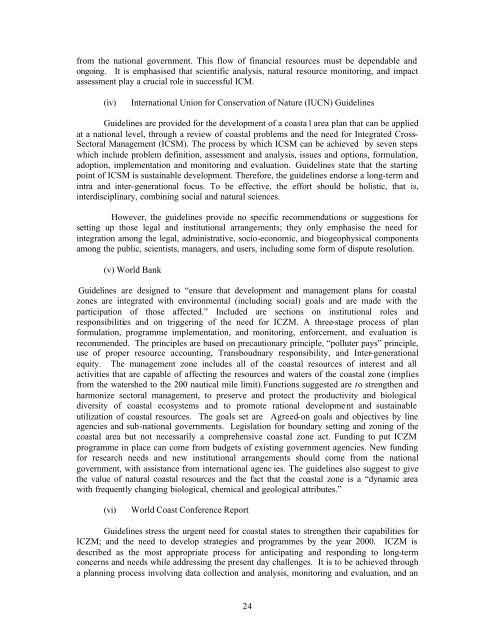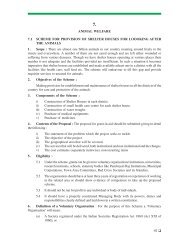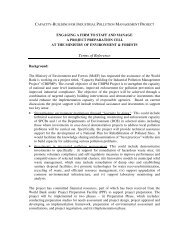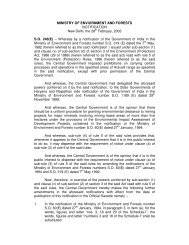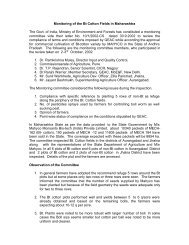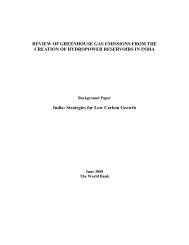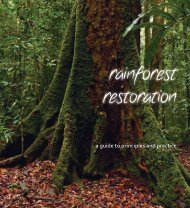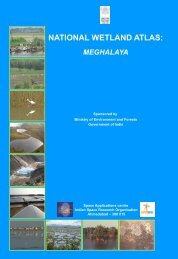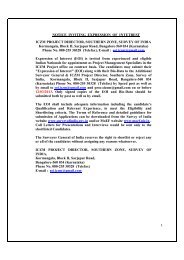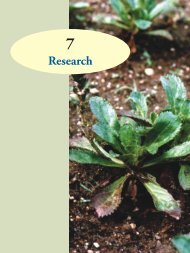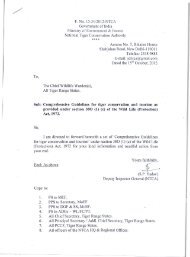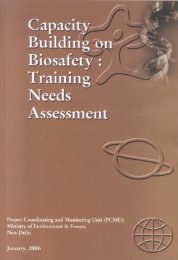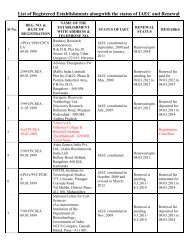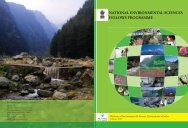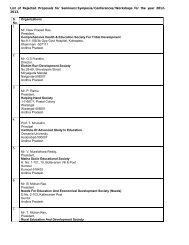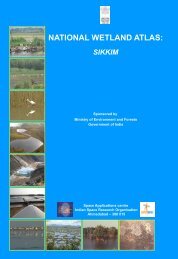pdf - Ministry of Environment and Forests
pdf - Ministry of Environment and Forests
pdf - Ministry of Environment and Forests
- TAGS
- ministry
- forests
- moef.nic.in
Create successful ePaper yourself
Turn your PDF publications into a flip-book with our unique Google optimized e-Paper software.
from the national government. This flow <strong>of</strong> financial resources must be dependable <strong>and</strong><br />
ongoing. It is emphasised that scientific analysis, natural resource monitoring, <strong>and</strong> impact<br />
assessment play a crucial role in successful ICM.<br />
(iv) International Union for Conservation <strong>of</strong> Nature (IUCN) Guidelines<br />
Guidelines are provided for the development <strong>of</strong> a coasta l area plan that can be applied<br />
at a national level, through a review <strong>of</strong> coastal problems <strong>and</strong> the need for Integrated Cross-<br />
Sectoral Management (ICSM). The process by which ICSM can be achieved by seven steps<br />
which include problem definition, assessment <strong>and</strong> analysis, issues <strong>and</strong> options, formulation,<br />
adoption, implementation <strong>and</strong> monitoring <strong>and</strong> evaluation. Guidelines state that the starting<br />
point <strong>of</strong> ICSM is sustainable development. Therefore, the guidelines endorse a long-term <strong>and</strong><br />
intra <strong>and</strong> inter-generational focus. To be effective, the effort should be holistic, that is,<br />
interdisciplinary, combining social <strong>and</strong> natural sciences.<br />
However, the guidelines provide no specific recommendations or suggestions for<br />
setting up those legal <strong>and</strong> institutional arrangements; they only emphasise the need for<br />
integration among the legal, administrative, socio-economic, <strong>and</strong> biogeophysical components<br />
among the public, scientists, managers, <strong>and</strong> users, including some form <strong>of</strong> dispute resolution.<br />
(v) World Bank<br />
Guidelines are designed to “ensure that development <strong>and</strong> management plans for coastal<br />
zones are integrated with environmental (including social) goals <strong>and</strong> are made with the<br />
participation <strong>of</strong> those affected.” Included are sections on institutional roles <strong>and</strong><br />
responsibilities <strong>and</strong> on triggering <strong>of</strong> the need for ICZM. A three-stage process <strong>of</strong> plan<br />
formulation, programme implementation, <strong>and</strong> monitoring, enforcement, <strong>and</strong> evaluation is<br />
recommended. The principles are based on precautionary principle, “polluter pays” principle,<br />
use <strong>of</strong> proper resource accounting, Transboudnary responsibility, <strong>and</strong> Inter-generational<br />
equity. The management zone includes all <strong>of</strong> the coastal resources <strong>of</strong> interest <strong>and</strong> all<br />
activities that are capable <strong>of</strong> affecting the resources <strong>and</strong> waters <strong>of</strong> the coastal zone (implies<br />
from the watershed to the 200 nautical mile limit).Functions suggested are to strengthen <strong>and</strong><br />
harmonize sectoral management, to preserve <strong>and</strong> protect the productivity <strong>and</strong> biological<br />
diversity <strong>of</strong> coastal ecosystems <strong>and</strong> to promote rational developme nt <strong>and</strong> sustainable<br />
utilization <strong>of</strong> coastal resources. The goals set are Agreed-on goals <strong>and</strong> objectives by line<br />
agencies <strong>and</strong> sub-national governments. Legislation for boundary setting <strong>and</strong> zoning <strong>of</strong> the<br />
coastal area but not necessarily a comprehensive coastal zone act. Funding to put ICZM<br />
programme in place can come from budgets <strong>of</strong> existing government agencies. New funding<br />
for research needs <strong>and</strong> new institutional arrangements should come from the national<br />
government, with assistance from international agenc ies. The guidelines also suggest to give<br />
the value <strong>of</strong> natural coastal resources <strong>and</strong> the fact that the coastal zone is a “dynamic area<br />
with frequently changing biological, chemical <strong>and</strong> geological attributes.”<br />
(vi) World Coast Conference Report<br />
Guidelines stress the urgent need for coastal states to strengthen their capabilities for<br />
ICZM; <strong>and</strong> the need to develop strategies <strong>and</strong> programmes by the year 2000. ICZM is<br />
described as the most appropriate process for anticipating <strong>and</strong> responding to long-term<br />
concerns <strong>and</strong> needs while addressing the present day challenges. It is to be achieved through<br />
a planning process involving data collection <strong>and</strong> analysis, monitoring <strong>and</strong> evaluation, <strong>and</strong> an<br />
24


